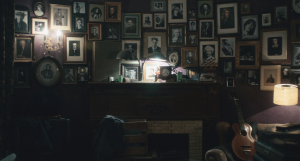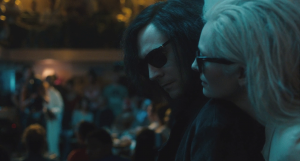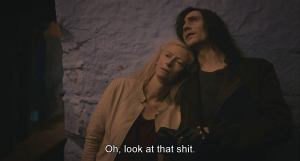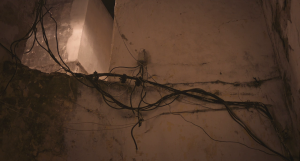Missed Madison Review

Only Lovers Left Alive (Jim Jarmusch, UK/Germany, 2013, 123 min)
Jim Jarmusch is not worried about any impending zombie apocalypse because he knows that we’re already in the middle of one. But luckily vampires will always be there to save us from pop culture philistines and squares, because vampires preserve everything that has been truly cool across the millennia as they endeavor to preserve themselves. In Only Lovers Left Alive, Jarmusch tips his hat to many vampire genre conventions while at the same time wandering through an idiosyncratic story structure that foregrounds many of his longtime preoccupations. That might not be enough for the zombies with short attention spans who cry out for brains, but the results are tasty for hipsters and aesthetes who don’t need to drink a movie dry, but can savor a fine glass of the good stuff.
Tom Hiddleston (Loki in Thor and The Avengers) and Tilda Swinton (most recently in Snowpiercer) star as Adam and Eve (no, not that Adam and Eve…or are they?) a pair of vampire lovers who begin the film separated in Detroit and Tangiers, respectively. Adam is hiding out in the ruins of Detroit, just wanting to be left alone as he works on his never-to-be-released drone music (which makes Only Lovers a good double feature with the Nick Cave film, 20,000 Days on Earth.) He can live in isolation because all of his needs are taken care of by Ian, a local zombie (read: hipster fanboy); and he satisfies his need for blood through an arrangement with a local doctor (Jeffery Wright). Eve gets her supply of “the good stuff” from fellow vampire Christopher Marlowe (John Hurt, and in this case, yes it is that Christopher Marlowe). Life seems good for these vampires, as long as they can avoid zombie culture and contaminated blood. Jarmusch takes his own sweet time exploring the world that these vampires have created for themselves, indulging Adam’s fascination with classic guitars and and Eve’s walks through the winding streets of Tangiers. Your patience for these sequences might depend on your taste in music and interest in some truly gorgeous cinematography. Despite their geographical separation, Adam and Eve always seem to be in each others thoughts through parallelisms and cross cutting. Then finally they are brought together through the miracle of Facetime, as Eve informs Adam that she will take the logistically difficult journey to visit him in Detroit.

Jarmusch continuously teases with a script that is fully aware of genre conventions but insists on its own episodic structure. Classic structure would suggest that a special wooden bullet introduced in the first act would need to be used by the third act, but I’ll let you see how that plays out (or doesn’t). The first hour, in fact, seems almost more interested in cataloging Adam and Eve’s interests that providing any genuine dramatic tension. When vampires in Detroit make a detour to drive by and admire Jack White’s house (much like the Japanese tourists in Mystery Train), we know that we are in a Jim Jarmusch movie. This might seem self-indulgent to some, but I found it very engaging and full of wry humor, thanks in large part to Hiddleston and Swinton generating some genuine chemistry and fully committing themselves to the world that Jarmusch creates. One expects that from Swinton in anything she is in, but Hiddleston is a refreshing surprise since I’ve only seen him as adequate in the Marvel films. It is not until the introduction of Eve’s sister, Ava (Mia Wasikowska, in a wonderfully over-the-top performance) more than an hour into the film that we get into the messier side of vampires. Ava helps to flesh out some of the parallels between vampirism, addiction, and rock and roll. While Adam and Eve have their dependence on blood in check (an approach and attitude more akin to medical marijuana), Ava wants to party on blood-driven binges. So not only do Adam and Eve have to deal with the zombie philistines, they also have to deal with decidedly un-cool vampires (and worse, un-cool younger relatives). Adam and Eve are The Velvet Underground; Ava is Phish. Whether intentional or not, Eva’s hair and costume suggest Kate Hudson’s groupie Penny Lane in Almost Famous, but as Adam’s assistant Ian soon finds out, Ava can be even more draining.

When Ava upsets the delicate balance and isolation that Adam had achieved in Detroit, Eve takes Adam back with her to Tangiers, where the couple must decide how to sustain themselves without their established sources of uncontaminated blood. Even here, with the most dramatic obstacle facing the protagonists, Jarmusch allows for an extended scene where Adam is aesthetically seduced by a Lebanese singer performing in a cafe. A full three minute song is performed, interrupting the plot just as the film should be building to a dramatic climax. Or “should” if Jarmusch were interested in doing so. Instead Jarmusch allows us to make a discovery along with Adam (“Eve, this bird is fantastic!”). Discovery and appreciation seem to be just as life sustaining as blood for Adam and Eve. So while Jarmusch eventually connects the dots with expected vampire conventions, this song can be seen as the emotional climax of the film.

